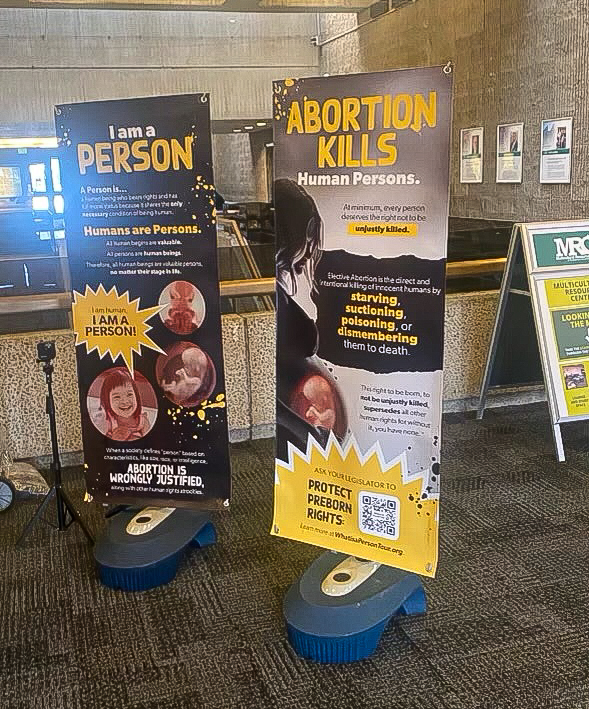Students for Life of America (SFLA), a pro-life organization that partnered with Binghamton University’s College Republicans, drew backlash with their recent tabling event.
On Sept. 18 in the Glenn G. Bartle Library breezeway, pro-choice student protesters approached the anti-abortion table — organized by the College Republicans and SFLA. According to Dara Silberstein, an associate research professor of women, gender and sexuality studies and the director of the women’s studies program, students in her Activism, Feminism and Social Justice class mentioned that “anti-choice folks” were outside tabling. After establishing ground rules, including no violence or yelling and to respect the tablers’ right to free speech, she took her class to confront them.
SFLA, which serves 1,400 campus groups, placed posters next to their table — two reading “I am a person” and “abortion kills human persons.” They included images of fetuses and small children and words like “suctioning” or “poisoning,” referring to abortion procedures. Protesters dropped model fetuses into their mouths during the demonstration, according to Logan Blakeslee, the secretary of the College Republicans and senior double-majoring in history and political science, and Penelope Rose, the northeast regional coordinator for SFLA.
Silberstein criticized SFLA’s and the College Republicans’ displayed anti-abortion rhetoric.
“I don’t know the impact of anti-choice tabling,” Silberstein wrote in an email. “It could be more impactful if their argument against reproductive rights was based on facts rather than the pseudoscience displayed.”
Abbey Scherer, the president of BU’s Abortion Advocacy Coalition (AAC) and a senior majoring in social work, expressed disappointment at the table’s presence in the library.
“It’s unfortunate that they want to take somewhere we all consider to be a safe place and use it to shame and scare students by displaying triggering images and discriminatory language,” Scherer wrote. “It says a lot about who they are and what they represent. It was incredible to see students joining to protest so naturally, with no hesitation to protect each other and force the hate out of our community.”
Blakeslee said that he arrived at the table around 2 p.m. and that no “unified opposition” had formed. Sometime between 3 p.m. and 3:30 p.m., Silberstein arrived with her class and started chanting “hey hey, ho ho, anti-choice has got to go.” Nearby students then began to join the protest.
Scherer said that though the tabling location was “technically” the Multicultural Resource Center’s, booking goes “through the Union” and all requests are automatically approved. Blakeslee said that the MRC stopped by periodically to manage noise levels, but that the the situation eventually got “out of hand” — a “heckler’s veto.” He claimed that the table’s goal was to educate students on alternate options and resources available to them if they were to become pregnant.
“We wanted to share the message that in the event that you suddenly become pregnant unexpectedly at a university, you can continue [your] education and get a successful career,” Blakeslee said. “There are pathways for assistance, and we wanted to make sure that students were aware of that. And at the same time, also, perhaps change minds and introduce our concept that life begins in the womb — which we understand is not a very popular position.”
Students in the AAC also raised concerns that anyone engaging with the table was being filmed. Blakeslee confirmed there was one camera recording students walking by for “security reasons.” New York state law says that only “one-party consent” is needed to record both in-person and telephone conversations.
Rose asserted that babies do not choose to die and pro-lifers “support choices,” in a recent blog post. She said that if somebody chooses to engage in sexual acts that could potentially create “new life,” they should choose parenting or adoption.
William Anderson, the president of the currently unchartered Students for Life chapter at BU and a junior majoring in biology, described why he was starting the group.
“One of the messages we want to spread and part of the reason we are establishing the [Students for Life] chapter is that there are people out here fighting for the pro-life cause,” Anderson wrote. “Many pro-life people believe that they are alone in their beliefs and that they cannot speak about their beliefs. We are willing to fight for this cause even in the face of opposition, and pro-life people should not fear being alone.”
Scherer said that students remain prepared to “push them right back out,” if the group attempts to return to campus. She emphasized that her organization refuses to normalize the “misinformation” and “hate” that they spread throughout the country.
Mims Harrington, a senior double-majoring in social work and women, gender and sexuality studies, attended the protest with their class. They addressed why protesting the group was relevant to their studies.
“I thought it was the perfect opportunity to mobilize the class and get involved,” Harrington wrote. “We’ve been talking about organized, collective action for weeks in class, and it was a perfect time to put those skills to use.”



